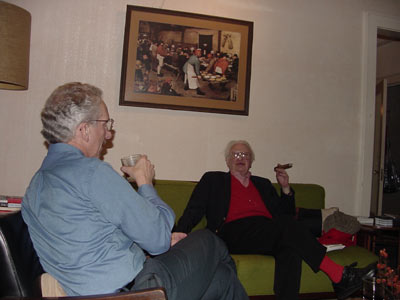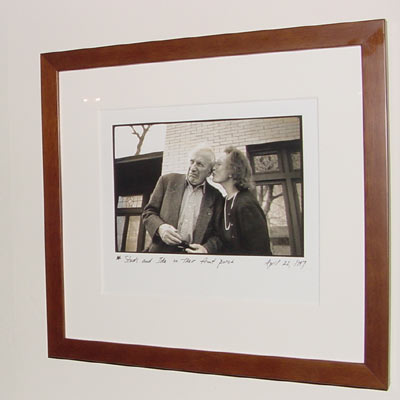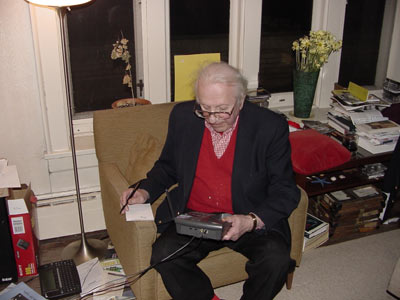|
 Gore Vidal many years ago suggested to Studs Terkel that he should write a book
on death. Early on in his career, that morbid subject for a book didn't
captivate his imagination. There were many other topics floating around in
Studs' head. A lifetime of writing books has come and gone. As Studs
approaches his ninetieth birthday, the topic of death and what faces us all has
become more relevant. In addition, the death of Ida, his wife and companion for
much of the 20th century, spurred him on to wrestle with answering
the age-old question: "Will the circle be unbroken" or put in a less poetic way:
Is that all there is?"
Gore Vidal many years ago suggested to Studs Terkel that he should write a book
on death. Early on in his career, that morbid subject for a book didn't
captivate his imagination. There were many other topics floating around in
Studs' head. A lifetime of writing books has come and gone. As Studs
approaches his ninetieth birthday, the topic of death and what faces us all has
become more relevant. In addition, the death of Ida, his wife and companion for
much of the 20th century, spurred him on to wrestle with answering
the age-old question: "Will the circle be unbroken" or put in a less poetic way:
Is that all there is?"
To answer the question for himself and for
his most recent book, "Will the Circle Be Unbroken," Studs resorts to a tried
and true technique used throughout his life-that of interviewing others about
what they think. His book is a collection of the thoughts of over eight
thousand people. Studs has an optimistic, if not naïve, assumption that the
common person has great insights into truth. He interviewed some of the shakers
and movers of the world, but most of the book contains the thoughts of average
Americans and their struggle with what there is after death. Some of the
answers to the question are unique and thoughtful. Other answers were parochial
and expected.
Studs' book offers us all an aide as we struggle with this critical of questions
of life-is there life after death? Having tapped the intellects of hundreds,
Studs repeatedly claims that he still doesn't know. When others and I have
pushed him on this question, he darts behind the term, agnostic. Pressed still
further, he just shrugs his shoulders.
I had the unique opportunity to get an insight into the way Studs dealt with the
most devastating death in his life-the death of his wife, Ida. In Studs' home,
he has two personal shrines to her. As you enter his dining room, you notice a
buffet against the long wall. The buffet serves as an altar to his love for
Ida. On the table are hundreds of letters of condolences-some opened and
probably many unopened because the loss was so painful. Above the buffet, one
can't help but notice a pair of photos, which serve as Studs' version of altar
pictures. One of the pictures is a beautiful photo of Ida. The other picture
is a funny one that reveals much of their relationship. It pictures Studs with
an indifferent expression on his face while Ida attempts to give his a kiss.
 The other holy place is in his living room. On a large windowsill next to his
recliner and telephone are two items, which are never far from Studs. One is
the urn with Ida's ashes as near as she was in life. The other is a vase of
fresh daisies, her favorite flowers. While these two shrines are comforting to
him, they are also testimonies to not knowing. He is able to keep Ida alive in
a small way until he discovers the answer to the question: Will the circle be
unbroken?
The other holy place is in his living room. On a large windowsill next to his
recliner and telephone are two items, which are never far from Studs. One is
the urn with Ida's ashes as near as she was in life. The other is a vase of
fresh daisies, her favorite flowers. While these two shrines are comforting to
him, they are also testimonies to not knowing. He is able to keep Ida alive in
a small way until he discovers the answer to the question: Will the circle be
unbroken?
 As I drove home late that night after the interview, dinner, and drinks and
cigars with Studs, his love for and the subsequent pain related to her death was
almost too much. Here was a man who had spent his life supporting thousands in
their struggles of life, but who was there to support him? Studs lent his
mighty voice and forceful words to those without a spokesperson, but there he
was suffering as the world went by. I wanted somehow to prove to Studs that the
circle will be unbroken and that there will be a time when they will be together
again. Winding through dark streets on my way home that night, I wanted him to
know that his dark suffering will turn to joy some day. My pain and empathy for
Studs' suffering was somewhat abated by knowing that he will again have those
playful moments with the love of his life. The circle will be unbroken for
Studs, Ida, and all of us. You can count on that.
As I drove home late that night after the interview, dinner, and drinks and
cigars with Studs, his love for and the subsequent pain related to her death was
almost too much. Here was a man who had spent his life supporting thousands in
their struggles of life, but who was there to support him? Studs lent his
mighty voice and forceful words to those without a spokesperson, but there he
was suffering as the world went by. I wanted somehow to prove to Studs that the
circle will be unbroken and that there will be a time when they will be together
again. Winding through dark streets on my way home that night, I wanted him to
know that his dark suffering will turn to joy some day. My pain and empathy for
Studs' suffering was somewhat abated by knowing that he will again have those
playful moments with the love of his life. The circle will be unbroken for
Studs, Ida, and all of us. You can count on that.
|







 Gore Vidal many years ago suggested to Studs Terkel that he should write a book
on death. Early on in his career, that morbid subject for a book didn't
captivate his imagination. There were many other topics floating around in
Studs' head. A lifetime of writing books has come and gone. As Studs
approaches his ninetieth birthday, the topic of death and what faces us all has
become more relevant. In addition, the death of Ida, his wife and companion for
much of the 20th century, spurred him on to wrestle with answering
the age-old question: "Will the circle be unbroken" or put in a less poetic way:
Is that all there is?"
Gore Vidal many years ago suggested to Studs Terkel that he should write a book
on death. Early on in his career, that morbid subject for a book didn't
captivate his imagination. There were many other topics floating around in
Studs' head. A lifetime of writing books has come and gone. As Studs
approaches his ninetieth birthday, the topic of death and what faces us all has
become more relevant. In addition, the death of Ida, his wife and companion for
much of the 20th century, spurred him on to wrestle with answering
the age-old question: "Will the circle be unbroken" or put in a less poetic way:
Is that all there is?"  The other holy place is in his living room. On a large windowsill next to his
recliner and telephone are two items, which are never far from Studs. One is
the urn with Ida's ashes as near as she was in life. The other is a vase of
fresh daisies, her favorite flowers. While these two shrines are comforting to
him, they are also testimonies to not knowing. He is able to keep Ida alive in
a small way until he discovers the answer to the question: Will the circle be
unbroken?
The other holy place is in his living room. On a large windowsill next to his
recliner and telephone are two items, which are never far from Studs. One is
the urn with Ida's ashes as near as she was in life. The other is a vase of
fresh daisies, her favorite flowers. While these two shrines are comforting to
him, they are also testimonies to not knowing. He is able to keep Ida alive in
a small way until he discovers the answer to the question: Will the circle be
unbroken?  As I drove home late that night after the interview, dinner, and drinks and
cigars with Studs, his love for and the subsequent pain related to her death was
almost too much. Here was a man who had spent his life supporting thousands in
their struggles of life, but who was there to support him? Studs lent his
mighty voice and forceful words to those without a spokesperson, but there he
was suffering as the world went by. I wanted somehow to prove to Studs that the
circle will be unbroken and that there will be a time when they will be together
again. Winding through dark streets on my way home that night, I wanted him to
know that his dark suffering will turn to joy some day. My pain and empathy for
Studs' suffering was somewhat abated by knowing that he will again have those
playful moments with the love of his life. The circle will be unbroken for
Studs, Ida, and all of us. You can count on that.
As I drove home late that night after the interview, dinner, and drinks and
cigars with Studs, his love for and the subsequent pain related to her death was
almost too much. Here was a man who had spent his life supporting thousands in
their struggles of life, but who was there to support him? Studs lent his
mighty voice and forceful words to those without a spokesperson, but there he
was suffering as the world went by. I wanted somehow to prove to Studs that the
circle will be unbroken and that there will be a time when they will be together
again. Winding through dark streets on my way home that night, I wanted him to
know that his dark suffering will turn to joy some day. My pain and empathy for
Studs' suffering was somewhat abated by knowing that he will again have those
playful moments with the love of his life. The circle will be unbroken for
Studs, Ida, and all of us. You can count on that.